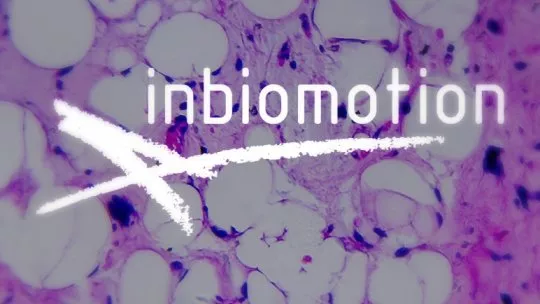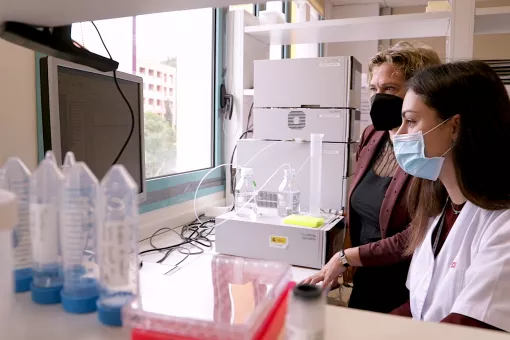Images
The test predicts the likelihood of developing bone metastasis and identifies breast cancer patients that would benefit from adjuvant clodronate, thus greatly improving their survival.
Developed by Inbiomotion, a spin-off from IRB Barcelona and ICREA, the test has been successfully assayed in two clinical trials, involving a total of 6,500 patients.
The use of the MAF Test® as a selection criterion for clodronate treatment could save the lives of some 15,000 women a year in Europe and the US.
Approximately 1 in 8 women will develop breast cancer, and in 15% of these patients, it will spread to the bone. Although breast cancer has a high survival rate, of around 85%, the prognosis worsens considerably in patients with metastasis.
Inbiomotion, the spin-off from IRB Barcelona and ICREA founded by Dr. Roger Gomis, has developed a test that predicts the likelihood of a breast cancer patient developing bone metastasis and, at the same time, determines whether this person would benefit from adjuvant treatment with clodronate.
According to the results of the two clinical trials, patients with MAF-negative tumours (around 80% of the total number) who were treated with clodronate had a 30% improvement in disease-free survival and a 41% lower risk of death than untreated individuals. In contrast, patients with MAF-positive tumours did not have any benefit from clodronate treatment. Belonging to the biphosphonate class of drugs, clodronate is commonly used to treat osteoporosis. Its use in humans has been widely studied and it is safe and shows minimal toxicity.
The results of the second clinical trial have recently been published in the Journal of National Cancer Institute, Cancer Spectrum. "This clinical trial confirms our previous results and the use of the MAF Test® as a unique tool for the personalised treatment of early-stage breast cancer,” says Dr. Joël Jean-Mairet, Executive Chairman of the Board of Inbiomotion. “More than 700,000 people are diagnosed with early-stage breast cancer in Europe and the US every year, and improving their treatment options through personalised medicine is an important goal," he adds.
The MAF gene and its role in breast cancer
The MAF gene acts like an orchestra conductor, activating and blocking a large number of genes, and it plays a key role in breast cancer metastasis, particularly in the spread to the bone. It regulates processes such as cell survival, the initiation of metastasis, metabolic rewiring, and also adhesion to cells from the bone marrow, and the formation of osteoclasts, a cell type responsible for remodelling bone.
“It has been some time since we identified MAF as a key target for breast cancer metastasis in the lab. This study confirms that the combined use of chemotherapy and bone-modifying drugs has a crucial impact on the survival of MAF-negative patients and we are working to get the MAF test® adopted in clinical practise and for it to be commonly used in hospitals and medical centres,” says Dr. Gomis, ICREA researcher and head of the Growth Control and Cancer Metastasis lab at IRB Barcelona.
About Inbiomotion
Inbiomotion SL is a spin-off from IRB Barcelona and ICREA. It was founded in 2011 by Dr. Roger Gomis, after identifying the MAF gene as a biomarker for breast cancer metastasis to bone, with the aim to develop the MAF test® to boost personalised medicine and improve the treatment of patients with breast cancer. Alta Life Sciences, Ysios Capital, Caixa Capital Risc, la Fundació Vila Casas and other small investors have backed Inbiomotion.
The results of the first trial with well-annotated archived simples from the AZURE trial and the later confirmation in the NSABP-B34 trial indicate the potential use of MAF test® as a diagnostic tool for personalised medicine. The company has more than 190 patents and patent applications covering the patented diagnostic MAF Test® and its use in the adjuvant biphosphate treatment of patients with early-stage breast cancer.
Related article:
MAF Amplification and Adjuvant Clodronate Outcomes in Early-Stage Breast Cancer in NSABP B-34 and Potential Impact on Clinical Practice
Alexander H G Paterson, Peter C Lucas, Stewart J Anderson, Eleftherios P Mamounas, Adam Brufsky, Luis Baez-Diaz, Karen M King, Thomas Lad, André Robidoux, Melanie Finnigan, Miguel Sampayo, Juan Carlos Tercero, Joël Jean Mairet, Antonio C Wolff, Louis Fehrenbacher, Norman Wolmark & Roger R Gomis
JNCI Cancer Spectrum (2021) DOI: 10.1093/jncics/pkab054
About IRB Barcelona
The Institute for Research in Biomedicine (IRB Barcelona) pursues a society free of disease. To this end, it conducts multidisciplinary research of excellence to cure cancer and other diseases linked to ageing. It establishes technology transfer agreements with the pharmaceutical industry and major hospitals to bring research results closer to society, and organises a range of science outreach activities to engage the public in an open dialogue. IRB Barcelona is an international centre that hosts 400 researchers and more than 30 nationalities. Recognised as a Severo Ochoa Centre of Excellence since 2011, IRB Barcelona is a CERCA centre and member of the Barcelona Institute of Science and Technology (BIST).







